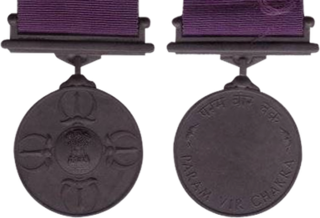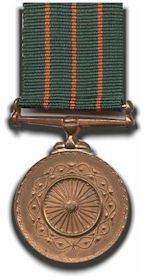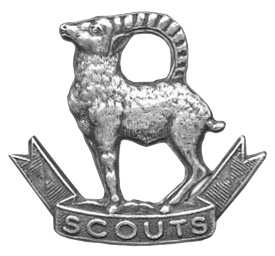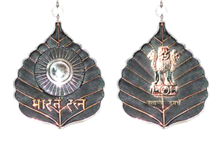
The Padma Vibhushan is the second-highest civilian award of the Republic of India, after the Bharat Ratna. Instituted on 2 January 1954, the award is given for "exceptional and distinguished service". All persons without distinction of race, occupation, position or sex are eligible for these awards. However, government servants including those working with PSUs, except doctors and scientists, are not eligible for these Awards. As of 2024, the award has been bestowed on 336 individuals, including thirty-one posthumous and twenty-one non-citizen recipients.
The Padma Bhushan is the third-highest civilian award in the Republic of India, preceded by the Bharat Ratna and the Padma Vibhushan and followed by the Padma Shri. Instituted on 2 January 1954, the award is given for "distinguished service of a high order...without distinction of race, occupation, position or sex." The award criteria include "service in any field including service rendered by Government servants" including doctors and scientists, but exclude those working with the public sector undertakings. As of 2020, the award has been bestowed on 1270 individuals, including twenty-four posthumous and ninety-seven non-citizen recipients.

The Param Vir Chakra (PVC) is India's highest military decoration, awarded for displaying distinguished acts of valour during wartime. Param Vir Chakra translates as the "Wheel of the Ultimate Brave", and the award is granted for "most conspicuous bravery in the presence of the enemy". As of January 2018, the medal has been awarded 21 times, of which 14 were posthumous and 16 arose from actions in Indo-Pakistani conflicts. Of the 21 awardees, 20 have been from the Indian Army and one has been from the Indian Air Force. Major Somnath Sharma was the first recipient. A number of state governments of India as well as ministries of the central government provide allowances and rewards to recipients of the PVC.

The Ashoka Chakra is India's highest peacetime military decoration awarded for valor, courageous action, or self-sacrifice away from the battlefield. It is the peacetime equivalent of the Param Vir Chakra (PVC) and is awarded for the "most conspicuous bravery or some daring or pre-eminent valour or self-sacrifice" other than in the face of the enemy. The decoration may be awarded either to military or civilian personnel.

The Shaurya Chakra is an Indian military decoration awarded for valour, courageous action or self-sacrifice while not engaged in direct action with the enemy. It may be awarded to civilians as well as military personnel, sometimes posthumously. It is third in order of precedence of peacetime gallantry awards and comes after the Ashoka Chakra and the Kirti Chakra. It precedes the Yudh Seva Medal.[total recipients 2094]. [total awarded posthumously is 677].

The KirtiChakra is an Indian military decoration awarded for valour, courageous action or self-sacrifice away from the field of battle. It may be awarded to civilians as well as military personnel, including posthumous awards. It is the peacetime equivalent of the Maha Vir Chakra. It is second in order of precedence of peacetime gallantry awards, comes after Ashoka Chakra and before Shaurya Chakra. Before 1967, the award was known as the Ashoka Chakra, Class II.

The Ladakh Scouts is an infantry regiment of the Indian Army, nicknamed as the "Snow Warriors" or "Snow Leopards". The regiment specializes in mountain warfare, and its primary role is to guard India's borders in the high altitudes of the Union Territory of Ladakh.

Subhash C. Kashyap is a former secretary-general of 7th Lok Sabha, 8th Lok Sabha and 9th Lok Sabha and Lok Sabha Secretariat from 1984 to 1990. He is also a well known political scientist, an expert in the Indian Constitution, Constitutional Law, Parliamentary Experts and a distinguished scholar. He also headed an International Centre for Parliamentary Documentation, IPU at Geneva till 1983. Kashyap was honorary constitutional advisor to the Government of India on Panchayati Raj Laws and Institutions. He is also recipient of several prestigious awards for the Best Books in Constitution, Law and Political Science. At present Dr. Kashyap is an honorary research professor at the Centre for Policy Research (CPR), New Delhi. He was also a member of the National Commission to Review the Working of Constitution and chairman of its drafting and editorial committee.
Air Marshal Minoo Merwan Engineer, PVSM, MVC, DFC was a former Air Officer in the Indian Air Force. He is one of the most decorated officers in the Indian Air Force, with the second-highest civil decoration - the Padma Bhushan, two gallantry awards - the Maha Vir Chakra and the Distinguished Flying Cross, and the highest peace-time distinguished service award - the Param Vishisht Seva Medal.
The Sarvottam Jeevan Raksha Padak is a civilian lifesaving award presented by the Government of India. Established on 30 September 1961, the award was originally called the Jeevan Raksha Padak, Class I.
The Uttam Jeevan Raksha Padak is a civilian lifesaving award presented by the Government of India. Established on 30 September 1961, the award was originally called the Jeevan Raksha Padak, Class II.

Dr. Shailendra Nath Shrivastava was an Indian essayist and poet, who wrote in Hindi, English and Bhojpuri. His body of work comprised over 100 publication of books like poetry, biographies, essays,Literary criticism etc. he also featured in more than 120 programs/broadcast of All India Radio / Doordarshan Patna and Delhi branch. He visited many foreign countries such as England, Scotland, Wales, France, Germany, Holland, Mauritius and Nepal. He was former Indian politician from Bihar born at Chausa, Bhojpur district. In 1980 he was elected to Bihar Legislative Assembly and in 1989, he was elected to Lok Sabha from Patna constituency of Bihar. He was a recipient of the civilian honor of Padma Shri (2003).
The President's Tatrakshak Medal or President's Coast Guard Medal is an Indian military decoration, awarded for exceptional devotion to duty or courage in Indian Coast Guard. It is conferred by the President of India every year on the occasion of national celebrations - the Independence Day and the Republic Day.
The Tatrakshak Medal or Coast Guard Medal is an Indian military decoration, awarded for conspicuous devotion to duty or courage in Indian Coast Guard. It is conferred by the President of India every year on the occasion of national celebrations - the Independence Day and the Republic Day.









